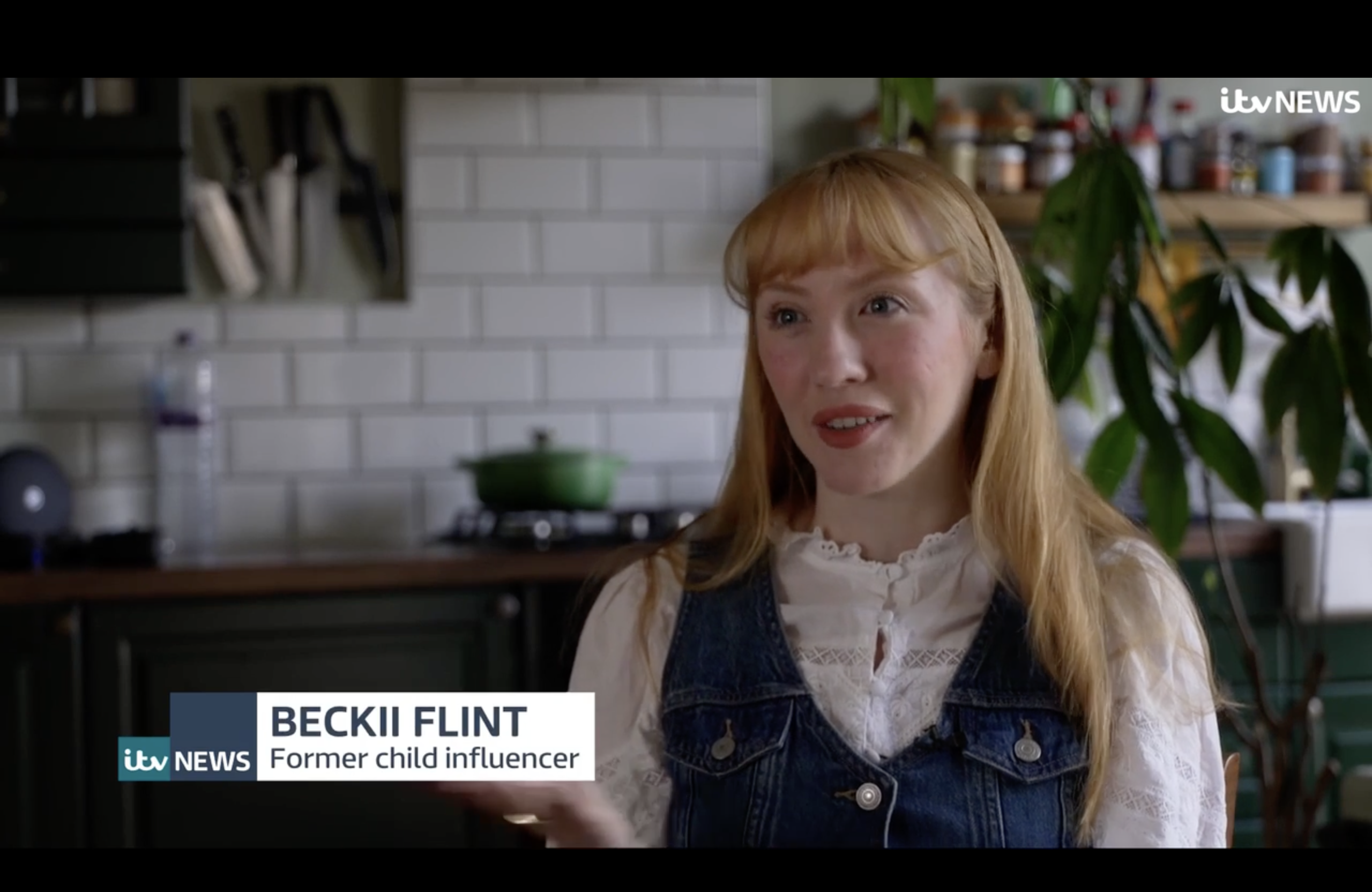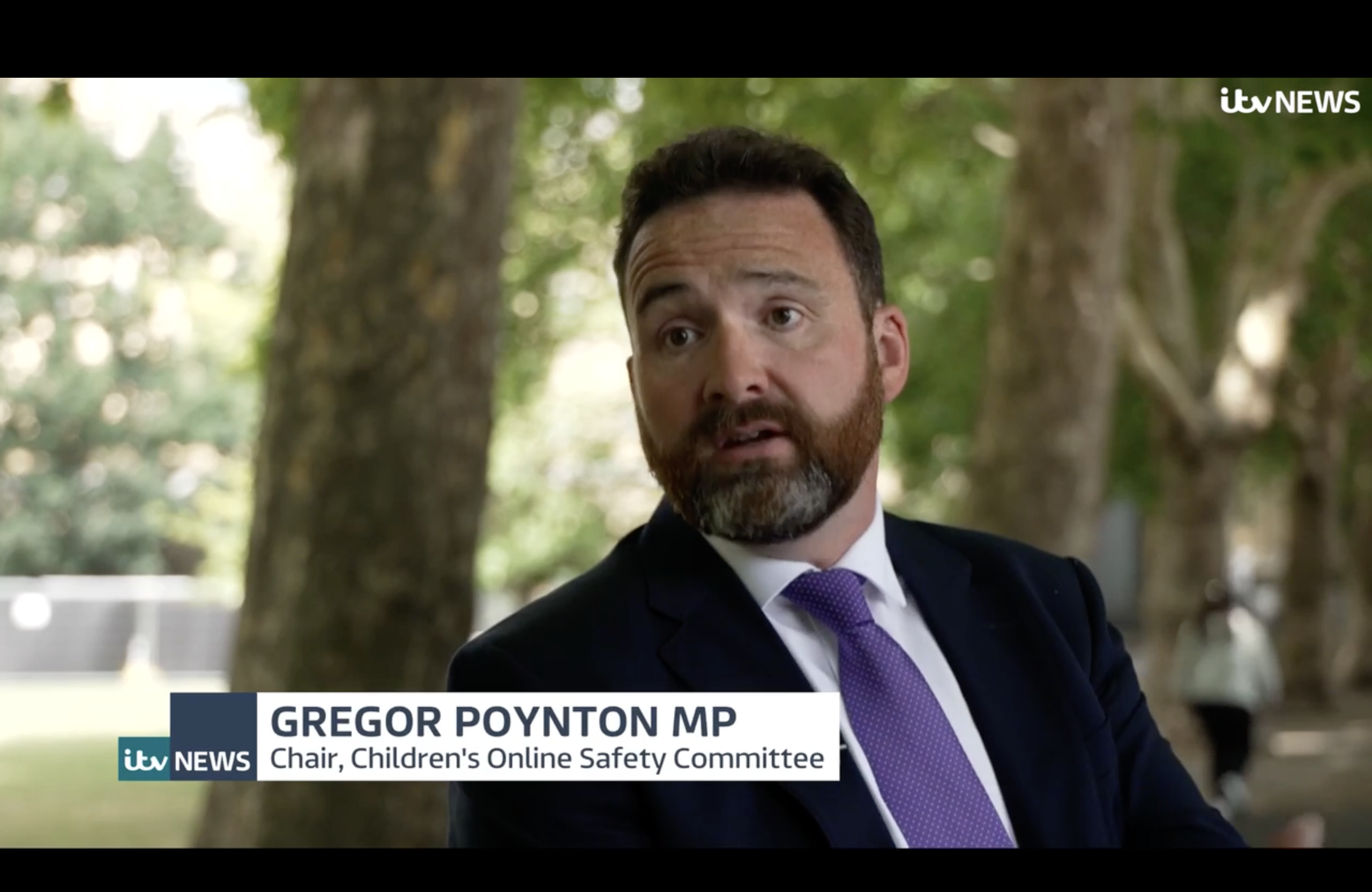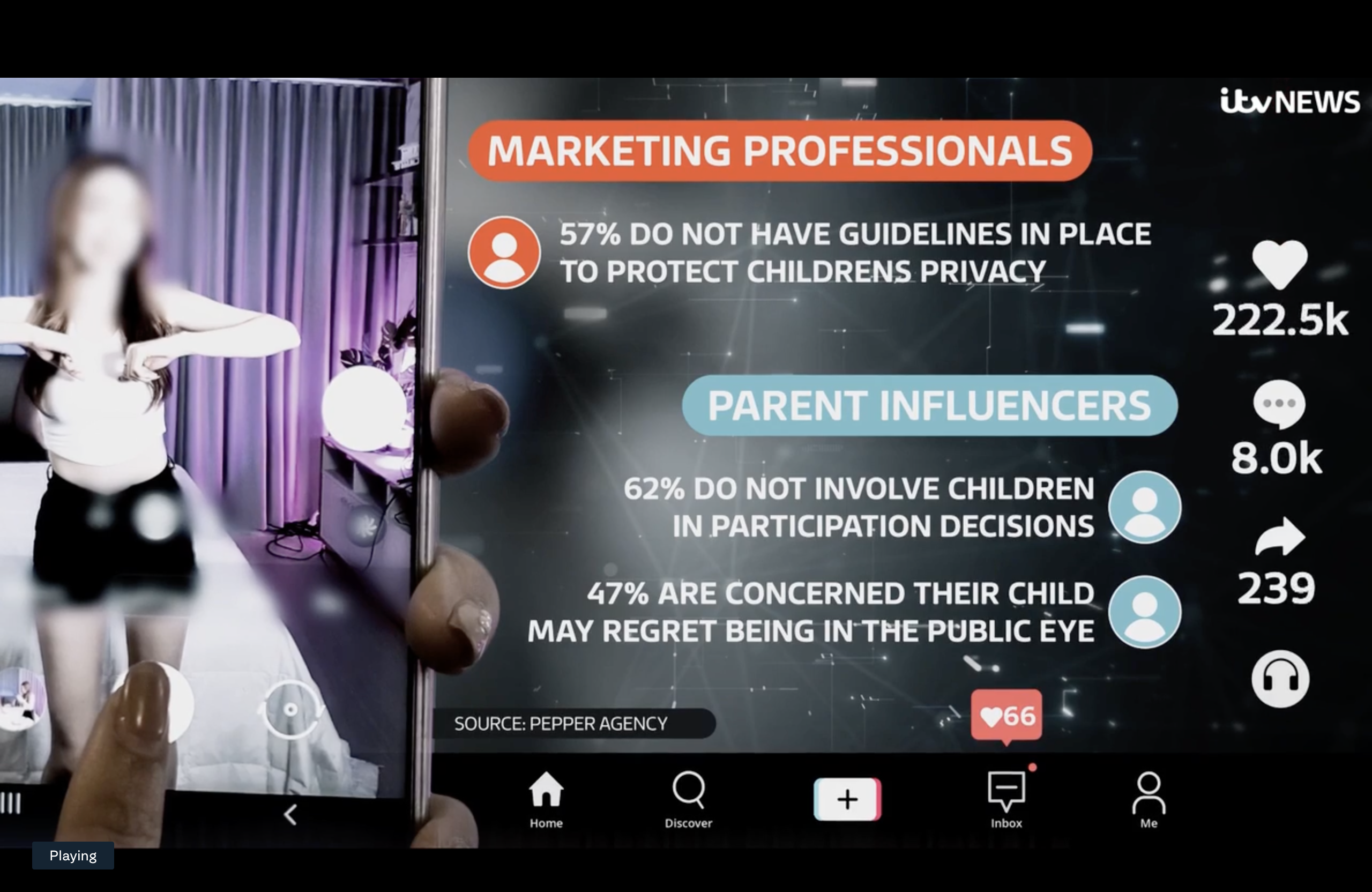ITV News x Pepper Agency: Championing Responsible Kidfluence

Last night, ITV News shone a crucial spotlight on the burgeoning, yet often unregulated, world of child influencers, featuring Pepper Agency's own Beckii Flint. Her appearance underscored the urgent need for greater protections for children navigating the complexities of online content creation. The decision by a major national broadcaster like ITV to feature this topic, prominently including Pepper Agency, signals a growing public and media awareness of the ethical issues surrounding child influencing. This provides a powerful platform for Pepper Agency to amplify its message and firmly establish itself as a leading authority in this critical domain.
At Pepper, the profound implications of this digital frontier for children have long been recognised. This understanding has driven the development of the Responsible Kidfluence Code – a vital framework designed to safeguard the well-being, privacy, and future of young online talent. The agency is not merely observing the evolution of this industry; it is actively shaping its responsible future by providing tangible, actionable solutions that protect the most vulnerable participants in the digital economy.
The Voices of Change: Insights from Beckii Flint and Gregor Poynton
The recent ITV News feature brought to the forefront the compelling perspectives of two key figures advocating for child protection in the digital space: Beckii Flint, a former child influencer and the architect of Pepper Agency's Responsible Kidfluence Code, and Gregor Poynton, MP and Chair of the All-Party Parliamentary Group on Children's Online Safety. Their insights collectively underscore the urgent need for robust frameworks to protect young online talent.
Beckii Flint's Journey: From Kidfluencer to Advocate

Beckii's journey from a 13-year-old YouTube sensation, whose videos garnered millions of views, to a leading advocate for child protection in the digital space, is both inspiring and sobering. Her "Hannah Montana life" between home and Japan, while seemingly glamorous, came with significant personal costs.
Flint candidly shared the lasting negative impacts on her mental well-being and privacy. She recounted reading "really horrible things about yourself" in unfiltered comment sections, which severely affected her self-esteem and self-image. Furthermore, her privacy was routinely breached, with her school details becoming "common knowledge" and packages being sent to her as a child. These deeply personal experiences were the catalyst for her to create a "kidfluence code" – a framework designed to solidify guidance on acceptable practices. The Code's four main pillars – mental well-being, financial well-being, privacy, and safety – are a direct response to the very challenges she endured.
Flint advocates for practical measures such as showing only the backs of heads, blurring faces, or using fake names to protect children's privacy. She stresses the critical need for this framework to prevent scenarios where a child becomes the primary earner for a household, especially in extreme cases where channels earn millions of pounds a month. Her experiences transform the abstract concept of "child protection" into a tangible, emotionally resonant issue. Her advocacy for a structured code, stemming directly from past harm, highlights the critical need for proactive industry standards. This approach aims to mitigate future similar cases, rather than waiting for further incidents to occur. By developing a code based on this lived experience, Pepper, through Flint's leadership, champions a shift from a reactive, crisis-management approach to a preventative, ethical framework. This positions the agency as a leader in foresight and responsible innovation, aiming to mitigate harm before it manifests.
Gregor Poynton's Call to Action: Addressing the Legislative Void

Adding a crucial political dimension to the discussion, Gregor Poynton, MP and Chair of the All-Party Parliamentary Group on Children's Online Safety, underscored the significant legislative gap concerning kidfluencers. He voiced a grave concern that it might take "something incredibly bad happening" for the government to take notice and act on this issue.
Poynton highlighted that the DCMS select committee in 2022 had already identified the "kidfluencer piece" as a "real issue and a real gap in legislation" in their report on influencer culture. Yet, he noted a distinct lack of drive to advance this issue in either the previous or current government. His comments provide vital context on the political inertia surrounding this problem. Despite parliamentary recognition of the issue, concrete legislative action has been lacking, making self-regulatory frameworks such as Pepper Agency's Responsible Kidfluence Code even more vital in the interim.
Poynton's statements reveal a significant regulatory lag where digital innovation outpaces legislative capacity. This is a common pattern in rapidly evolving digital spaces, where technology moves faster than traditional legislative processes, creating a period of vulnerability for susceptible populations like children. This scenario creates a vacuum that industry-led initiatives, such as Pepper Agency's Code, are uniquely positioned to fill. In this regulatory void, self-regulatory bodies and industry leaders become the de facto guardians. Pepper Agency is not merely suggesting guidelines; it is providing a critical interim solution where formal law is absent. This positions the agency as a responsive, responsible, and indispensable player in shaping the immediate future of the industry, stepping in where government has faltered.
The Data Speaks: Unpacking the Industry's Challenges
The urgency articulated by both Beckii Flint and Gregor Poynton is powerfully underscored by compelling data, prominently featured in the ITV News broadcast and accredited to Pepper Agency. These statistics paint a stark picture of the current landscape within the kidfluencer industry, revealing significant gaps in protection and awareness.
Key Challenges in the Kidfluencer Industry (Source: Pepper Agency)

The revelation that 57% of marketing professionals lack guidelines to protect children's privacy is alarming. This is not merely an oversight; it suggests a systemic blind spot within the industry, where commercial imperatives may inadvertently overshadow fundamental child protection principles. Without clear protocols, children are left vulnerable to data exploitation, identity issues, and exposure to inappropriate content or interactions. This statistic indicates that the problem is not necessarily malicious intent, but rather a widespread absence of established best practices and a clear industry standard for child privacy. This points to a structural deficiency in industry norms, not just individual failings, and implies a significant opportunity for Pepper Agency's Code to become the de facto standard, directly filling this void by providing comprehensive guidelines.
Equally concerning is that 62% of parent influencers do not involve their children in participation decisions. This statistic highlights a fundamental ethical dilemma: the absence of a child's agency and informed consent in decisions that profoundly impact their public identity, privacy, and future. It raises questions about child labour laws in the digital age and the potential for exploitation when children are treated as assets rather than autonomous individuals. This directly conflicts with established principles of child rights, particularly regarding consent and participation in matters affecting them, blurring the line between parental guidance and potential exploitation, especially when significant financial gains are involved. If children are not involved in decisions, they may not develop the critical media literacy or personal boundaries needed to navigate public life, potentially leading to resentment or psychological issues later.
Finally, the fact that 47% of parent influencers are concerned their child may regret being in the public eye is a powerful indicator of growing apprehension within the community itself. This is not an external critique but an internal acknowledgment of the potential long-term psychological and social ramifications for children who grow up under the constant gaze of the internet. This concern underscores the preventative nature of Pepper Agency's Code, aiming to mitigate future regret by establishing safeguards today. This statistic acts as a "canary in the coal mine," foreshadowing a potential future crisis of regret, mental health issues, and even legal challenges from former child influencers. If parents are already concerned, it suggests that a significant number of children will likely experience negative outcomes as they mature and reflect on their public childhoods. This provides a powerful, human-centric argument for the Responsible Kidfluence Code, positioning Pepper Agency as a visionary leader addressing tomorrow's challenges today by proactively preventing a future societal problem.
Pepper's Proactive Stance: The Responsible Kidfluence Code
In response to these pressing concerns and the clear legislative void, Pepper Agency developed the Responsible Kidfluence Code. This comprehensive framework is built upon four foundational pillars, each meticulously designed to address the multifaceted challenges faced by child influencers and their families:
- Mental Well-being: Ensuring content creation does not negatively impact a child's self-esteem, body image, or psychological health. This includes guidelines on managing comments, avoiding excessive screen time, and fostering a balanced childhood.
- Financial Well-being: Protecting a child's earnings, ensuring fair compensation, and establishing transparent financial management to safeguard their future, preventing situations where a child becomes the sole or primary earner for a household.
- Privacy: Implementing robust measures to protect a child's personal information, location, and identity. This includes practical advice like blurring faces, using fake names, or showing only the backs of heads to maintain a degree of anonymity and control over their public persona.
- Safety: Establishing protocols to prevent online grooming, cyberbullying, and exposure to inappropriate content or interactions, ensuring a secure digital environment for children.
The Code directly addresses the systemic issues highlighted by Pepper Agency's research and the experiences of individuals like Beckii Flint. By providing clear guidelines for marketing professionals, it offers the missing framework that 57% currently lack. For parent influencers, it champions the importance of involving children in decisions, combating the 62% statistic, and provides tools to alleviate the concerns of the 47% who fear future regret. Pepper Agency's transition from identifying the problem, through its research and advocacy, to providing a concrete solution in the form of the Code, positions it as a holistic thought leader. Many organisations can identify problems, but fewer can develop and champion comprehensive, actionable solutions.
By presenting the problem and then immediately offering the Code as the answer, Pepper demonstrates a complete cycle of leadership: research, understanding, innovation, and implementation. This positions the agency not just as an industry participant, but as an indispensable partner for brands and parents navigating this complex space, offering both insights and practical tools.
Shaping a Safer Digital Future: Pepper's Commitment
The launch of the Responsible Kidfluence Code is just the beginning of Pepper Agency's ongoing dedication to fostering a safer, more ethical digital environment for children. The agency believes that innovation and responsibility must go hand-in-hand, particularly when it involves the lives and futures of young people.
Pepper Agency extends an open invitation to all industry stakeholders – fellow agencies, brands, content creators, and parents – to engage with, adopt, and champion the Responsible Kidfluence Code. By working collaboratively, a new standard of care can be established, ensuring that the opportunities of the digital age do not come at the expense of a child's well-being. This invitation signifies Pepper's ambition to influence the entire industry, not just its own clients. By inviting collaboration and framing it as "building a legacy of protection," the agency is attempting to establish the Code as the definitive benchmark for responsible practice, filling the legislative void highlighted by Gregor Poynton. This represents the ultimate expression of thought leadership – creating a framework that others adopt, thereby shaping the industry's future.
At Pepper Agency, the vision is a future where every child influencer can explore their creativity and engage with digital platforms in a manner that is safe, private, and truly empowering. Through the Responsible Kidfluence Code, the agency is not just setting guidelines; it is building a legacy of protection for the next generation of digital talent.
Sources & Links:
ITV News TV piece
ITV News Article
The Responsible Kidfluence Code Website
Download The Responsible Kidfluence Code Report
RSVP to The Responsible Kidfluence Code Virtual Launch Event, 9th September 2025
Explore Our Latest Insights
Stay updated with our latest articles and resources.





Ready to elevate your marketing strategy?
Let’s add some spice to your next campaign 🌶️


.png)



